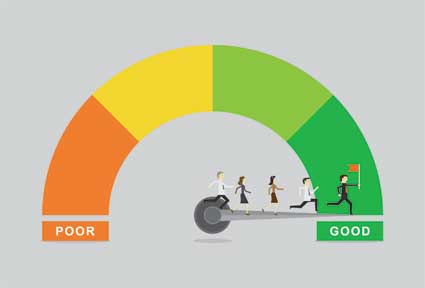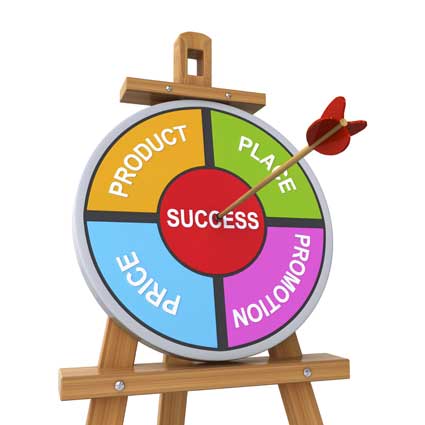Most people believe that career management and development means skills, education, and training. They don't think that personal development plays a part to their career success. To them, their personal development has nothing to do with their careers, because they feel it has nothing to do with work. However, that's a mistake.
Your job skills and education only take you so far in your career. You also need attitudes, beliefs, and behaviors that will lead you to success. In fact, personal development is a critical key to career success.
About Personal Development
Personal development can be defined as activities that improve awareness and identity, develop your talents and potential, and build human capital. In other words, personal development is doing things that improve you and the world around you. Personal development can include your hobbies, as well as books you read. In this article, we're going to explore ideas for personal development that you can implement.
Work on Communication
Most people are terrified of public speaking. It's the one thing most of us fear. However, by taking a communications class, you can overcome that fear. In addition, better communication skills tend to lead to better personal and professional relationships.
Read Books
Motivational and inspirational books can teach you a lot. They can teach you to deal with conflict in your personal and professional life. They can motivate you, empower you, and uplift you. You can learn things from motivational books that you won't learn at school or at work, but will improve you as a person and as an employee.
Get a Hobby
Find a creative hobby that you can do in your spare time, whether it's painting, decorating your home, drawing, writing, or even sewing. Using your creativity is proven to help you be more sensitive to the world around you. Plus, it helps you think more creatively in the workplace.
Volunteer
You'll be surprised at how much you get back when you volunteer. Helping others helps you appreciate the obstacles that other people face. It also helps you refine your people and leadership skills, both at work and outside of it.
Join an Exercise Program
Getting exercise is about a lot more than getting in shape or losing weight. It also gives you confidence and helps you sleep better. In addition, it relieves stress.
Find Work/Life Balance
You've probably heard it from people before. The phrase, "I don't have time to ___________ because of all the hours I put in at the office."
It's a common phrase that too many people offer as an excuse for ignoring personal development. However, personal development is about more than having a hobby. It's about more than giving back to the community, losing weight, or learning to communicate better with your spouse. It's about improving you.
Make time for personal development. Make time to do things you enjoy, because they benefit your career as much as they provide relaxation and enjoyment to you.
Take a look at the suggestions we made above and how they positively influence your career:
-
Work on communication. Better communication skills at work means you become a better problem-solver and communicate what you need from others.
-
Motivational books teach you how to network more successfully, how to get raises and promotions, how to deal with "trouble" people who constantly cause conflict.
-
Creativity gives you a different way of seeing things. You'll see yourself coming up with more creative solutions at work.
-
Volunteering gives you perspective on other people's problems and obstacles. It improves your empathy and compassion, but also improves your people skills and makes you a more effective leader.
-
Exercise relieves stress that builds up at work to help reduce career stagnation or burnout. Plus, when you are healthier and feel like you look good, you're more confident.
Career Development
Chances are, you do not work alone. You work in a company filled with other employees who are all doing their jobs and building their careers. Whether you work with a dozen or 500 other people, you all have the same basic goals: getting paid for work while you build your careers.
-
So what makes you different?
-
What makes you stand out?
Or are you just part of the rank and file who the company, including executive management, see as just another cog in the wheel?
About Career Distinction
Those who achieve career distinction don't just move up that proverbial ladder. And they don't just follow their career path by getting promotions within the company (or even different companies).They stand out from their peers and colleagues.They become thought leaders. They become the ones who get where they want to go quicker in their careers.
In this section, we're going to talk about developing an extraordinary career, and the things you need to do to make that happen. Some things are run-of-the-mill career development strategies. Others aren't. Others will lead you to stand out and to achieve a career of distinction.
How to Stand Out
As we just said, everyone at work does their job. At least they do their job if they want to keep it. But what can you do to stand out?
The people who stand out have opportunities presented to them. They advance quicker than everyone else and get attention (and praise) from bosses and managers alike.
To stand out at work:
Offer ideas and suggestions . Suggest ways that your job can be done more efficiently. However, make sure the suggestions are of value to the company. Don't make suggestions just to sound good. Make the suggestions good.
Contribute during meetings . Too many employees make the mistake of being quiet during meetings so it will be over with as quickly as possible. However, management notices contributors. Be a leader and contribute during meetings. You'll stand out for it.
Make going above and beyond a habit . Do more than what your job duties require of you. For example, instead of telling a customer to call the accounting department to take care of a billing problem, do it for them. Your boss will notice, and you will receive praise for going that extra mile.
Offer to help . Become the person your colleagues can go to when they need help with work. When you do that, you become a resource to bosses and managers, instead of another employee.
Anticipate problems . Suggest solutions to problems before they arise. Come up with the plan to fix it, then do it, or share it with your boss.
Be Your Own Boss
Years ago, a company managed your career for you. You went to work, you did your job, the company gave you promotions, and � when it came time � they gave you a pension when you retired. In other words, the company took care of you.
Companies no longer do that in today's world. In today's world, you are required to manage your own career. Nobody is going to do it for you. You have to be your own boss. You have to be the boss of your own career.
Now, keep in mind that we are not saying you should do what you want at work, or define your own job description. Not at all. Instead, you must be the boss of your own career, just as we said in the last paragraph.
This means answering a few important questions:
Where do you want to go?
Where you want to go will influence the steps you take at work and in your career. It will influence the job you do. It will influence how you dress, your attitude, and what skills and knowledge you work to acquire.
What do you need to accomplish this year to get there?
Once you know where you want to go, you can figure out what you need to do this year to get there. Just as your boss gives you work or duties that you must complete, you need to give yourself things you need to accomplish to get where you need to go.
Maybe it's refining a skill. Taking a class. Getting a new position.
Tell yourself where you need to accomplish to get where you want to go. Be your own boss and make sure the job (your career) gets done. This is a huge part of what will make you successful in your career.
Forget the Ladder
Most people who are focused on their careers are also focused on moving up that proverbial ladder. However, it's important to remember that the ladder is part of the big picture. Moving up is how you're going to get from point A to point Z, but (again) it's part of the big picture.
Put the ladder in the garage, and shut the door. Although you need to move up to accomplish your career goals, you also need to focus on doing your job until it's time to move up. You need to manage your career every day, not just when it's time to take that next step or get that promotion. You need to focus on advancing your career every day.
Ask yourself:
-
What am I doing today that will help advance me?
-
Am I doing things that will make me stand out?
Remember that everything you do can advance your career. It isn't just the ladder that matters. Everything you do today influences the career you will have tomorrow.
Building Your Personal Brand
Kraft makes mayonnaise. We all that. Who hasn't seen Kraft Mayonnaise on the store shelves at one time or another?
Vlasic makes pickles. We know this, too.
Kraft and Vlasic have both made themselves household names. The people behind these names have made Kraft and Vlasic brands that we recognize.
Someone says Kraft. We say mayo.
Someone says Vlasic. We think pickle.
That said, what do people think about when they hear your name?
Building your personal brand will influence how far your career goes. It will influence the promotions you get, the jobs you get, and even your bosses' opinions of you.
Your personal brand makes you stand out. It makes you memorable.
Your personal brand will be reflected in your day-to-day work. It will also be reflected in your career marketing tools, such as your portfolio, resume, bio, and cover letter.
It will tell who you are and represent you.
However, building your personal brand takes a little bit of homework. It takes figuring out what you want to represent to others. It takes figuring out who you are � and asking yourself some important questions.
1. Start by figuring out the product you offer to others. We're not talking about a tangible product, but a service, special ability, etc. that you can offer others at work during your career. Maybe you're a thought leader. Perhaps people come to you when they need a fresh idea.
2. Next, identify your values. What matters the most to you? Is it influencing others, being an expert, helping others, or being an intellectual?
3. You also need to find your passions. What ideas or things do you love?
4. What are your talents? What talents do people recognize you for? Are you a great public speaker? Are you comical and good at telling jokes? List your talents.
5. Choose the top five talents and qualities, then combine all of them into a brief statement that displays your specialty.
6. Now add your values, passions, and skills to that statement. This is your brand.
7. Summarize your brand in one sentence.This is your tagline and describes you.
Once you've created your personal brand, you can start representing your brand in everything you do. Your personal brand will give your career marketing tools focus and precision. It will make it easier for potential employers to tell who you are and how you'll benefit their company. It will let your bosses and co-workers know who you are, as well � and make you stand out from everyone else.































